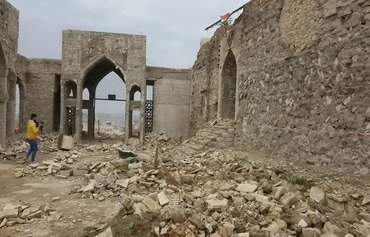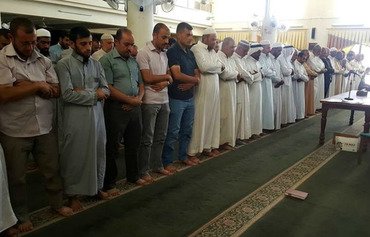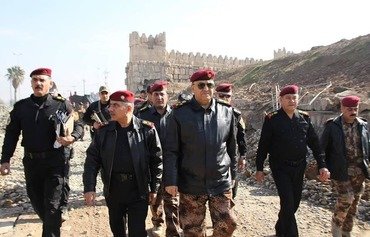As the call to prayer sounded from minarets around the city, residents of Mosul's eastern al-Muhandiseen neighbourhood headed for the Wajih al-Saydali Mosque.
While seemingly an ordinary sight, the continuance of the ritual of worship signaled the population's determination not to be cowed following a January 31st "Islamic State of Iraq and the Levant" (ISIL) attack on the mosque.
The incident, in which an ISIL drone dropped a bomb on worshipers as they left the mosque after evening prayers, killed an elderly worshiper and wounded others.
It was preceded by days of ISIL threats to attack mosques and places of worship in areas outside the group's control, officials told Diyaruna.
Despite the risks, Sumar neighbourhood resident Mufid Abdullah, 57, along with many other residents of eastern Mosul, continues to pray at his local mosque.
With its threat to attack mosques, he told Diyaruna, ISIL seeks "to disrupt the normal course of life and instill fear in people’s minds".
"If we refrain from performing our religious duties in mosques and all our daily affairs, it means that we have given in to their desire, and we will not accept that," he said.
ISIL singles out mosques
ISIL has been targeting mosques as they play a critical role in "fighting extremism and strengthening the elements of peace and social brotherhood", Abdullah said.
Mosques also have been singled out by ISIL in light of the "moral support they are giving to the security forces" fighting to take back west Mosul, said Sheikh Mohammed al-Shammaa, imam and preacher of al-Nabi Yunus Mosque.
The attack on Wajih al-Saydali Mosque was not the only terrorist incident targeting places of worship in the eastern part of the city.
"On March 10th, al-Souraji and al-Salam mosques in Sumar neighbourhood were attacked with mortar shells during the Friday prayer, but the army managed to safely evacuate the worshipers," al-Shammaa said.
ISIL has been trying to attack mosques by any means to silence the voice of truth and tolerant values that is being heard from their pulpits , he said.
"Before that, when they occupied the city, they destroyed all historic mosques that are symbolic and holy to the Muslims, such as the mosques of al-Nabi Yunus, al-Nabi Sheet and al-Nabi Jarjis," he said.
Violation of right to worship
ISIL elements have assassinated many imams and preachers who refused to pledge allegiance to the group or accept its actions, al-Shammaa said.
"This band of terrorists is continuing its series of attacks on religious icons and landmarks and the violation of people’s rights to worship," he said.
Mosques are serving once again as a platform for moral preaching, spreading tolerance and correcting religious concepts that ISIL has distorted in order to harm the social fabric of Iraq, said Abu Bakr Kanaan, head of the Sunni Endowment in Ninawa.
"Once they sensed these platforms pose a major danger to their deviant ideology and propaganda, they tried to silence them and prevent people from coming to mosques," he said.
Their acts are having the opposite effect, however, Kanaan said, noting that "the attacks have bolstered the people’s resolve and mosques in eastern Mosul are today witnessing remarkable attendance of worshipers".
ISIL destroyed 37 mosques in Mosul, mostly ancient ones that stand as archaeological landmarks with great cultural significance and value to the city.
Rebuilding places of worship
The Sunni Endowment Diwan has made it known that it intends to rebuild the mosques destroyed by ISIL in Mosul and other Iraqi cities.
On March 18th, the foundation stone was laid for the reconstruction of the historic al-Nabi Yunus Mosque that was blown up by ISIL on July 24, 2014.
Abu al-Qassim Mohammed Mosque, in the Diyala province city of Baquba, reopened on March 24th, three years after a terrorist bombing killed at least 20 people and wounded many others.
ISIL’s attacks on religion know no limits, said Ninawa provincial council member Khadida Hamo, who is a Yazidi.
The group regards anyone who thinks differently or does not display its loyalty to it as an enemy who must be annihilated, he told Diyaruna.
"As part of that limitless violence, the terrorists have destroyed at least 30 ancient Yazidi shrines in the areas of Sinjar, Bashiqa and Bahzani, such as the shrines of Sheikh Hassan, Malik Fakhreddine and Mujamma al-Risala," he said.
ISIL also has destroyed Christian churches, he said.
"The people are now rehabilitating these places of worship with the means available to them, and resuming practicing their religious rituals there," he said. "This is their firm response to terrorism."

![Iraqi officials assess damage to the historic al-Nabi Yunus Mosque in Mosul caused by extremist acts. [Photo courtesy of the Sunni Endowment]](/cnmi_di/images/2017/04/03/7544-Iraq-Mosul-mosque-600_384.jpg)






